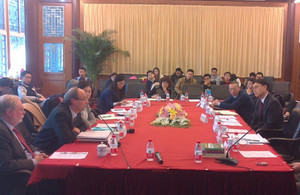Collaboration to support research into China’s development lessons and engagement with Africa
DFID and ESRC announce £4.5 million collaboration to support research into China’s development lessons and engagement with Africa.

DFID and ESRC announce £4.5 million collaboration to support research into China’s development lessons and engagement with Africa.
The UK Department for International Development (DFID) and the Economic and Social Research Council (ESRC) have announced a collaboration of up to £4.5 million, to support research into the economic development impact of China’s engagement in sub Saharan Africa; and how lessons from China’s own successful and rapid economic transformation could generate practical measures for low-income Africa.
The unprecedented pace and scale of China’s economic growth and structural transformation has led domestically to millions being lifted out of poverty within just a few decades and its emergence as a global economic player. As such, China is often portrayed as a rich learning ground for those looking for approaches to promote economic development in low- and middle-income countries. At the same time, China’s growing engagement with Africa – be it through direct investment, trade, commercial lending, technology transfer or development aid – has sparked a lot of media and political attention.
DFID and the ESRC have partnered to launch a programme of research that will critically evaluate what lessons China’s own economic development transformation can offer other developing countries – in particular in low-income Africa – and help deepen current knowledge of how Chinese engagement with Africa has contributed, in comparative perspective, to the continent’s economic development prospects.
Professor Stefan Dercon, DFID’s Chief Economist said:
China’s involvement in Africa is transforming the continent. Strong views are expressed on the actual and potential role of China in Africa, but too many are based on either a naïve interpretation of China’s own development experience and its transferability, or on an anecdotal understanding of Chinese current interactions, based on limited and questionable evidence. Quality research by researchers from all over the world, including from Africa and China, is urgently required.
Professor Paul Boyle, Chief Executive of the ESRC, commented:
Through this programme, we aim to generate robust data and knowledge on implementable and sustainable solutions for Africa’s economic development. We also see this as a key opportunity to strengthen our social science collaborations between the UK, China and Africa.
This programme will fund rigorous, high quality research from across the social sciences and provide evidence relevant for decision-makers, particularly in Africa and China, but also to other interested development actors in the global North and South.
The programme is open to organisations with a demonstrable research capacity and from anywhere in the world. Academics from the Global North and South, China and Africa are strongly encouraged to work together in any configuration of their choosing.
Successful projects will either take as a starting point a developmental challenge facing Africa and examine possible solutions linked to recent experience from China’s own economic development, or build our understanding of aspects of China’s engagement with Africa relevant to the continent’s economic development.
Research grants will be for up to four years in duration with a value of between £200,000 and £2 million. The submission deadline for proposals is 16.00 UK time on 13 March 2014. For more information on the research programme and the application process, please visit http://www.esrc.ac.uk/DECARP or contact DECARP@esrc.ac.uk.